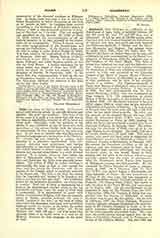

Allah, the name of God in Arabic. It is a compound word from the article, ‘al, and ilah, divinity, and signifies “the god” par excellence. This form of the divine name is in itself a sure proof that ilah was at one time an appellative, common to all the local and tribal gods. Gradually, with the addition of the article, it was restricted to one of them who took precedence of the others; finally, with the triumph of monotheism, He was recognized as the only true God. In one form or another this Hebrew: AL root occurs in all Semitic languages as a designation of the Divinity; but whether AL was originally a proper name pointing to a primitive monotheism, with subsequent deviation into polytheism and further rehabilitation, or was from the beginning an appellative which became a proper name only when the Semites had reached monotheism, is a much debated question. It is certain, however, that before the time of Mohammed, owing to their contact with Jews and Christians, the Arabs were generally monotheists. The notion of Allah in Arabic theology is substantially the same as that of God among the Jews, and also among the Christians, with the exception of the Trinity, which is positively excluded in the Koran, cxii: “Say God, is one God, the eternal God, he begetteth not; neither is he begotten and there is not any one like unto him.” His attributes, denied by the heterodox Motazilites, are ninety-nine in number. Each one of them is represented by a bead in the Mussulmanic chaplet, while on the one hundredth and larger bead, the name of Allah itself is pronounced. It is preposterous to assert with Curtiss (Ursemitische Religion, 119) that the nomadic tribes of Arabia, consider seriously the Oum-el-Gheith, “mother of the rain”, as the bride of Allah; and even if the expression were used, such symbolical language would not impair, in the least, the purity of monotheism held by those tribes. (Cf. Revue Biblique, October, 1906, 580 sqq.) Let it be noted that although Allah is an Arabic term, it is used by all Moslems, whatever be their language, as the name of God.
R. BUTIN

